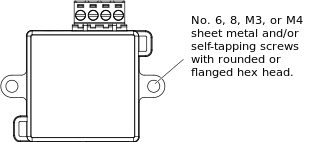The RS-485 Power Adapter (SXWNISORS485P10001) is used with BACnet/IP controllers to support the connection of various types of devices to an RS-485 based network such as Room Bus, Sensor Bus, or a Modbus RTU network. The RS-485 Power Adapter is a flexible device that can be used for several different applications, which mainly fall into the following categories:
The RS-485 Power Adapter can be used with all BACnet/IP controller (RP and MP controller) models. The types of RS-485-based networks supported differ between the RP and MP controller models.
action_zoom_plus_stroke

Figure:
RS-485 Power Adapter
RS-485 Power Adapter Device Installation
The RS-485 Power Adapter has a protruding bracket on each long side with a mounting hole to facilitate installation of the device with two screws (not included). The device can also be fastened using cable ties or mounted in line with a cable run. The device has two anchor points that can be used to fasten cable ties or other accessories for bundling wires. The adapter is suitable for plenum use.
For more information, see Installing an RS-485 Power Adapter
.
RS-485 Power Adapter Ports, Terminals, and Switch
The RS-485 Power Adapter is equipped with dual RJ45 ports, a 4-position removable screw terminal block, and a 2-pole slide switch.
For more information, see RS-485 Power Adapter Ports, Terminals, and Switch
.
Convert a BACnet/IP Controller RS-485 Interface
The RS-485 Power Adapter can be used to convert a BACnet/IP controller (RP or MP controller) RS-485 interface from RJ45 port to screw terminals, which is required to be able to connect the controller to an RS-485 based network such as a Modbus RTU network. The types of RS-485-based networks supported differ between the different RP and MP controller models.
For more information, see Convert a BACnet/IP Controller RS-485 Interface
.
Enable Injection of 24 VDC from an External Power Supply to an RS-485 Bus
The RS-485 Power Adapter can be used for injecting 24 VDC from an external 24 VDC power supply to an RS-485 based network such as Room Bus or Sensor Bus. This is useful, for example, in applications where you want to extend the RS-485 bus by connecting (daisy-chaining) additional devices, which the RP or MP controller would otherwise not be able to power. The external power supply is connected to the bus via the adapter.
For more information, see Enable Injection of 24 VDC from an External Power Supply to an RS-485 Bus
.
Specifications
| Electrical |
| Required external power supply ratings
|
Output
|
Regulated 24 VDC
|
|
|
Isolated (non-grounded) terminals
|
Safety class and certification
|
IEC protection class II
|
|
|
Safety agency certification applicable to the country or area where used
|
Output power
|
Minimum 3 W (125 mA)
|
|
|
Maximum 100 W or 100 VA
|
Maximum out port bus load
|
3 W
|
| Environment |
Ambient temperature, operating
|
0 to 50 °C (32 to 122 °F)
|
Ambient temperature, storage
|
-40 to +70 °C (-40 to +158 °F)
|
Humidity
|
Maximum 95 % RH non-condensing
|
| Material |
Plastic flame rating
|
UL94 V-0
|
Plenum rating
|
UL 2043
|
Ingress protection rating
|
IP 20
|
| Mechanical |
Dimensions
|
See drawing below
|
action_zoom_plus_stroke

|
Weight
|
24 g (0.84 oz)
|
Installation
|
Connection to RS-485 bus via Cat 5 UTP cable (not included)
a
|
Installation options
|
The adapter can be fastened using screws or cable ties or mounted in line with a cable run.
a
|
|
|
Approved for plenum installation (UL 2043)
|
| Hardware |
Connectors
|
RS-485, 4-pole removable screw terminal block
|
|
|
RS-485, dual RJ45 ports
|
Switch
|
2-pole slide switch
|



 RS-485 Power Adapter
RS-485 Power Adapter
 Connecting an RS-485 Power Adapter to Convert a BACnet/IP Controller RS-485 Interface
Connecting an RS-485 Power Adapter to Convert a BACnet/IP Controller RS-485 Interface
 Wiring the Screw Terminals on an RS-485 Power Adapter for Connection to an RS-485 Bus
Wiring the Screw Terminals on an RS-485 Power Adapter for Connection to an RS-485 Bus
 Connecting an RS-485 Power Adapter to an External Power Supply to Inject 24 VDC to an RS-485 Bus
Connecting an RS-485 Power Adapter to an External Power Supply to Inject 24 VDC to an RS-485 Bus
 Wiring the Screw Terminals on an RS-485 Power Adapter for Connection of an External 24 VDC Supply
Wiring the Screw Terminals on an RS-485 Power Adapter for Connection of an External 24 VDC Supply

